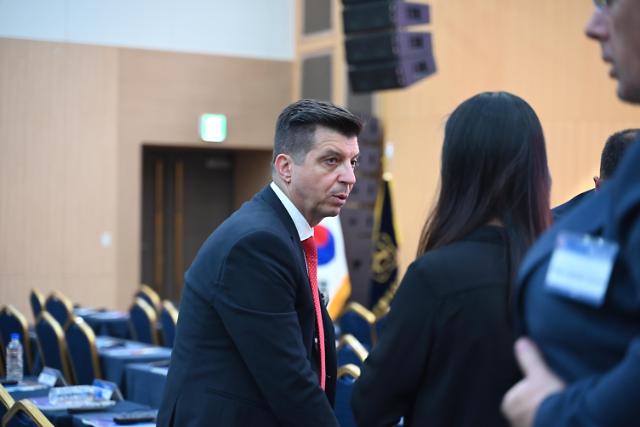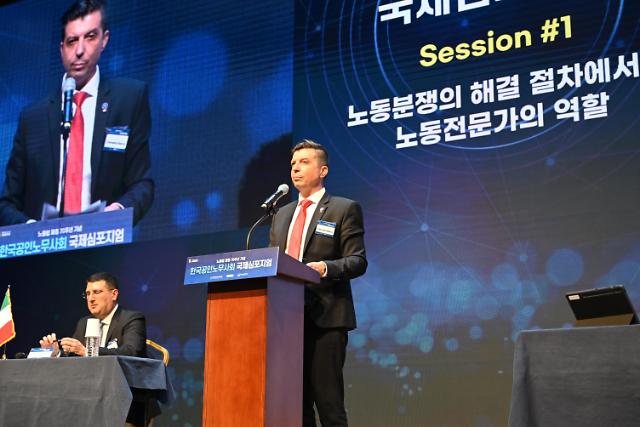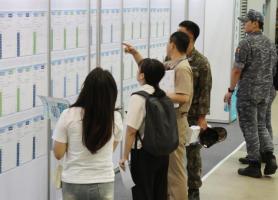
Corneliu Bențe, the President of the National Union of Labor Law Experts [Courtesy of the Korea Certified Public Labor Attorneys Association]
SEOUL -- Corneliu Bente, the president of Romania's national labor law expert union, has urged that South Korean firms should create a work culture that places importance on work-life balance. The president, who is also a lecturer at Romania's labor relations expert training center "LexAcademy Romania," said low fertility rate will be maintained if citizens are excessively focused on their careers.
Currently, South Korea's labor law allows 40 hours of regular work a week for most businesses and workplaces with five employees or more. Those who worked more than 40 hours can have their hours compensated for up to 12 hours of overtime. Entrepreneurs who force their employees to work more than 52 hours can be punished as the government limits employees to work up to 52 hours a week.
Despite the law, some South Korean employers have not properly paid their employees who worked for more than 40 hours, citing that calculating the exact number of working hours is difficult. According to a survey of 1,000 South Korean employees released in April 2023, about six out of 10 were not properly paid for working overtime. The survey conducted by pollster Embrain Public showed that 50.9 percent of respondents have worked overtime. Among those who worked extra hours, 53.2 percent said their average weekly overtime hours were less than 6 hours. 33.2 percent said they worked for more than 6 hours and less than 12 hours. 13.5 percent worked for more than 12 hours, which is prohibited by the law.
Moreover, the South Korean government unveiled its scheme earlier this year to expand the maximum work hours to 69 from the current 52. While there are some opinions that the 69-hour workweek system would improve productivity in various sectors, many others argue that it would be only useful for employers.
"I believe that enough free time should be given at work so everyone can recharge themselves," Bențe told Aju Business Daily after hearing about South Korea's tragic reality where many employees work overtime without receiving additional pay. He said that strict regulations should be adopted at companies to realize a culture that values work-life balance.
When asked about Romania's work environment, the president said the country has completely transformed from a socialist country where all citizens had to work under the guidance of their government after joining the European Union (EU). "In Romania, overtime work is strictly regulated through legal measures. Employees must reach a consensus with their employers in case of working extra hours," the labor law expert said, adding that workers do not fear their boss when they need to express themselves. In principle, European workers are limited to working up to 48 hours a week.

[Courtesy of the Korea Certified Public Labor Attorneys Association]
Bențe thinks the low birth rates is one of the significant threats to the international community. "If people are excessively career-oriented, they will get married late and give birth at an advanced age," the expert expressed his concern, saying that such phenomena would decrease the number of young workers in the future.
The Romanian instructor hopes to cooperate with the international labor lawyers to come up with more effective methods for Romania's work environment such as remote working. He visited South Korea to attend a forum designed to celebrate the 70th anniversary of the enactment of the country's labor law. At the event organized by the Korea Certified Public Labor Attorneys Association, lecturers presented opinions regarding labor disputes including whether the Labor Standards Act should be applied to businesses with fewer than five workers. The forum held on May 25 was also participated by experts from Italy, Japan, Spain, and Canada.
Copyright ⓒ Aju Press All rights reserved.




